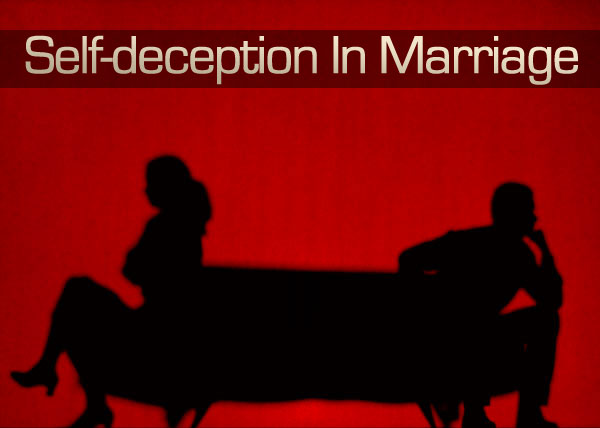Self-deception according to thefreedictionary.com is defined as the act or an instance of deceiving oneself, especially as to the true nature of one’s feelings or motives
It is also defined as a misconception that is favorable to the person who holds it.
I recently held a conversation with my brother regarding self-deception when it comes to marriage. The more we wrapped our brains around it, the more convicted I felt about my behavior in my own marriage.
A husband or wife can often fall into the trap of self-deception when their goal in the relationship is to prove themselves right. They begin believing a misconception about their marriage or about their spouse that is deceivingly favorable to themselves because it fuels a desire to be right. Self-deception has crept into many marriages and its damaging affects can leave two lovers in ruin.
Let me try and break it down in regards to marriage.
If I think my husband is a certain type of person, or that he does specific things that I feel are contrary to the character of a husband, I need to prove myself right. Therefore, my goal then becomes to prove myself right based off my husband’s actions. This may require a bit of manipulation to get the results that would then prove me right. This most often occurs during fights and disagreements. The seed of injustice or misconception gives birth to self-deception.
For example, if I want to say to my husband “You never take the trash out!” I need to build my case. I keep count of how many times the trash does or does not get taken out, and I intentionally neglect to remind my husband or kindly ask him to take it out, even though he would not hesitate to take it out upon mention. (For I know that if I mention it to him and he does he take out the trash, it will not prove me right in thinking that my husband never takes the trash out.)
Another example could be found in the intimacy department! If I feel like my husband never pursues me and that his lack of passion is the ruin of our marriage, when he does initiate intimacy I would most likely not appreciate it and reject his invitation to play. After repeatedly rejecting my husband, his confidence in our relationship will fade and soon enough he will stop pursuing me.
For another example, take a husband who works many hours. The wife may misconceive his working as him not invested into their marriage. She may feel unloved and neglected, convincing herself that he does not care about her. This mind-set may cause her to have a negative attitude towards her husband, leading to him feeling disrespected. Over time, he may choose to work even more to avoid her negative attitude, further fueling her feelings of feeling unloved.
One last example of how self-deception can be damaging to a marriage is when one that I struggle with many times and it starts in my heart as jealousy. If I believe my husband gives other people more attention then me, I am going to look for when he does give people more attention than me so that I can point it out and have proof that my unhappiness is his fault. It could be as simple as a conversation that he has with someone and then I complain that he never talks to me.
It sounds silly as I write it out, but it happens quite often.
Self-deception is the art of convincing ourselves of a misconception to validate a feeling we have. We even manipulate situations so to prove we are right in how we are thinking.

To reverse the affects of self-deception we need to remind ourselves that if our husbands are good-willed men, they are not trying to hurt us. If we feel a certain way, like unloved or jealous, we need to find the courage to talk to our husbands about it instead of assuming a lie that they are not good-willed and are out to destroy our marriages.
Does any of this make sense? Let me know your thoughts!
